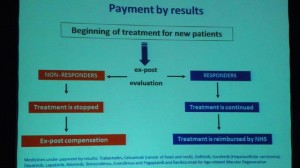Avastin for Breast Cancer is not Personalized Medicine
Bevacizumab (Avastin®) should be withdrawn for metastatic breast cancer. That is the unequivocal recommendation of the Oncology Drugs Advisory Committee (ODAC) yesterday.
Despite the passionate patient advocacy in favor of continued approval, withdrawal is the right decision and it is hard to see the FDA overruling ODAC, given the safety issues such as bowel perforations and relative lack of efficacy. The patient advocacy at this week’s public hearing was fundamentally biased, those who died early and who received no treatment benefit are not alive to stand up and share their experiences.
The bottom line is that Genentech were unable to identify the sub-set of patients who might benefit from the drug. They simply did not have the data, and the reality is that treating all potential HER2- patients in the hope of finding the few who might respond is not a rational drug development or marketing strategy, especially when those that don’t respond may do worse on the drug.
Personalized medicine requires a thorough understanding of the science and molecular biology of a disease. Pfizer recently showed an excellent example of this with crizotinib that targets ALK mutations in non small cell lung cancer (NSCLC).
It is disappointing that a scientifically orientated company such as Genentech would continue to try and push Avastin in Breast Cancer when the data is clearly unconvincing to ODAC. But, if we look at how Genentech approached the Lucentis v Off-label Avastin issue in AMD, with a 40x higher cost for using Lucentis, then what we see is that commercial decisions, and maximization of profit has become more important than doing what’s right for patients.

This is a flawed long-term strategy in my opinion. Society cannot afford to pay for treatments that don’t work in many patients or pay for treatments that are excessively priced. We are already seeing “pay for results” being introduced in Europe, notably England and Italy where payors are reimbursing companies only for those patients that respond.
Personalized medicine is the future. This requires targeted therapies that are aimed at patients who we can predict will have a good chance of responding based on our understanding of mutations, molecular biology and biomarkers.
Avastin in metastatic breast cancer is not an example of personalized medicine and should be withdrawn from the market for this indication.